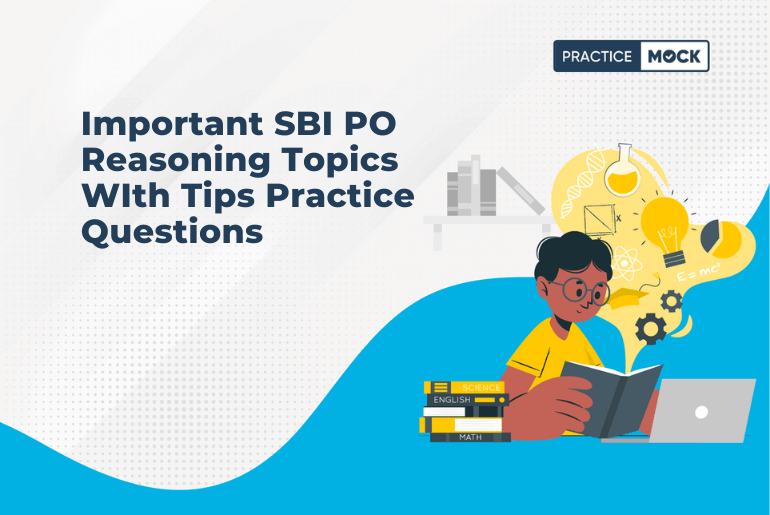The reasoning section in the State Bank of India Probationary Officer (SBI PO) exam is one of the crucial sections that candidates need to focus on for achieving success in the exam. This section assesses candidates’ logical and analytical abilities through various types of questions. Understanding the important reasoning topics is essential as it helps candidates prioritize their preparation and allocate time efficiently during their exam preparation journey.
Puzzles and Seating Arrangement
Puzzles and seating arrangement questions are among the most important topics in the SBI PO reasoning section. These questions test candidates’ ability to arrange information systematically and solve complex problems involving logical reasoning. Candidates should practice different types of puzzles such as linear arrangement, circular arrangement, floor-based puzzles, and puzzles with additional constraints to build their problem-solving skills in this area.
Syllogism
Syllogism is another critical reasoning topic that candidates must master for the SBI PO exam. Syllogism questions assess candidates’ ability to draw logical conclusions from given statements. Candidates should familiarize themselves with different types of syllogism problems such as categorical syllogism, possibility-based syllogism, and logical venn diagram-based syllogism. Practice is key to improving speed and accuracy in solving syllogism questions.
Coding-Decoding
Coding-decoding is a prominent reasoning topic in the SBI PO exam that tests candidates’ ability to decipher coded messages or words based on given coding rules. Candidates should practice a variety of coding-decoding questions involving letter shifting, number-based coding, symbol-based coding, and mixed coding patterns. Understanding the coding rules and applying logical reasoning skills is essential for solving coding-decoding questions efficiently.
Blood Relations and Directions
Blood relations and directions are fundamental reasoning topics that candidates cannot afford to ignore in the SBI PO exam. Questions related to blood relations test candidates’ ability to establish relationships between family members based on given information. Direction-based questions assess candidates’ understanding of spatial concepts and their ability to navigate directions accurately. Practice is crucial for mastering these topics and improving problem-solving speed.
Inequality
Inequality questions are also an important component of the reasoning section in the SBI PO exam. These questions assess candidates’ ability to compare quantities and determine the relationship between them based on given conditions. Candidates should practice solving inequality questions involving mathematical symbols such as greater than (>), less than (<), equal to (=), and their combinations. Strengthening conceptual understanding and practicing diverse question types is essential for success in this topic.
Conclusion
Mastering important reasoning topics is crucial for achieving success in the SBI PO exam. Candidates should focus on practicing puzzles, seating arrangement, syllogism, coding-decoding, blood relations, directions, and inequality questions extensively to improve their problem-solving skills and confidence in the reasoning section. By understanding the concepts, practicing diverse question types, and implementing effective problem-solving strategies, candidates can boost their performance and ace the reasoning section of the SBI PO exam.
- Sign Up on Practicemock for Updated Current Affairs, Free Topic Tests and Free Mini Mocks
- Sign Up Here to Download Free Study Material
Free Mock Tests for the Upcoming Exams
- IBPS PO Free Mock Test 2024
- RBI Grade B Free Mock Test 2024
- IBPS SO Free Mock Test 2024
- NABARD Grade A Free Mock Test 2024
- SSC CGL Free Mock Test 2024
- IBPS Clerk Free Mock Test 2024
- IBPS RRB PO Free Mock Test 2024
- IBPS RRB Clerk Free Mock Test 2024
- RRB NTPC Free Mock Test 2024
- SSC MTS Free Mock Test 2024
- SSC Strenographer Free Mock Test 2024
- GATE Mechanical Free Mock Test 2024
- GATE Civil Free Mock Test 2024
- RRB ALP Free Mock Test 2024
- SSC CPO Free Mock Test 2024
- AFCAT Free Mock Test 2024
- SEBI Grade A Free Mock Test 2024
- IFSCA Grade A Free Mock Test 2024
- RRB JE Free Mock Test 2024
- Free Banking Live Test
- Free SSC Live Test



